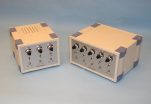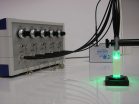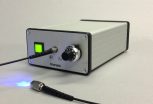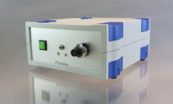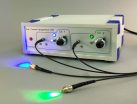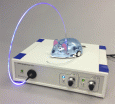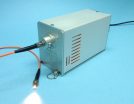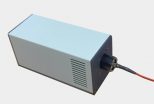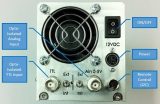Fiber-coupled LED light sources of Prizmatix
The fiber-coupled LED light sources from Prizmatix are an excellent replacement for lasers in many applications such as spectroscopy, optogenetics or crosslinking.
Optimized for fiber-coupling and highest optical performance, the light sources achieve amazing optical powers of up to 1100 mW after a 1 m long fiber (NA 0.63, 1500 µm core). Thanks to the compact design with the low-noise controller integrated into the housing, these light sources can be used almost anywhere and can be easily integrated as OEM components.
The LED light sources offer a variety of control options for power regulation such as an analog input, a TTL input, control via USB or the classical manual control via a potentiometer. Especially the TTL input makes these light sources an optimal solution for measurements with fiber-coupled spectrometers, for example in external trigger mode.
The main features of the fiber-coupled LED light sources are:
- Optimized for fiber coupling and highest optical power
- Various control options (analog, TTL, USB, potentiometer, depending on model)
- USB control compatible with µManager, Labview, Matlab and many more
- Analog and TTL inputs are optically isolated
- Low-noise controllers (e.g. FC-LED < 0.05% RMS)
- Long lifetime, typically >10,000 hours
- SMA connector
- Each LED comes with a test report
Please give us a call. We will be happy to assist you in choosing the right LED light source and accessories for your application.
Comparison of fiber-coupled LED light sources
| FC-LEDs / Silver-LED | Optogenetics-LED | FC-BBW-LED | HB-FC-White LED | |
|---|---|---|---|---|
| Special features | - high optical power - many LED channels in one housing - combination of several LED channels into one fiber - many wavelengths - several white LEDs | - very high optical power - very high brightness - broad range of accessories for complete optogenetics setups | - white LED - very broad spectral range from 400-700 nm - ideal for spectroscopy | - white LED - very high optical power - suitable for thin fibers |
| Wavelengths | white & monochromatic | monochromatic | white | white |
| Optical power1 | ● | ●● | ◐ | ●● |
| Price | ● | ●● | ● | ●●● |
| Connection | SMA | SMA | SMA | SMA |
| Controller | built into the housing | built into the housing | built into the housing | built into the housing |
| Potentiometer | ✔ | ✔ | --- | optional² |
| TTL input | ✔ | ✔ | --- | ✔ |
| Analogue input | ✔ | ✔ | --- | ✔ |
| USB control (optional) | ✔ | ✔ | --- | ✔³ |
| Available wavelengths4 [nm] | 280, 290, 310, 325, 340, 365, 380, 390, 395, 405, 410, 420, 425, 430, 445, 455, 465 , 480, 500, 515, 535, 550, 590, 630, 645, 655, 690, 700, 760, 770, 780, 805, 850, 870, 940 Weißlicht: 425-650 (bei 3000 / 4000 / 6500 K) | 407 (violet), 458 (blue), 500-600 (lime-green), 520 (green), 595 (yellow), 625 (orange-red), 655 (deep-red) | white: 400-700 | white: 450-650 |
| Variants | Silver-LED: 1 LED channel FC2: 2 LED channels FC3: 3 LED channels FC5: 5 LED channels | STSI: 2 LEDs combined into one SMA output port DUAL : 2 LEDs with 2 SMA output ports | ||
| Collimated equivalent LED | Mic-LED | UHP-T-SR / UHP-T-EP | --- | --- |
Note:
1: after 1 m POF fiber, 1000 µm core NA 0,63
2: via fiber-coupled remote control
3: via external Pulser/Pulser Plus or USB-TTL
4: status 20.01.2019
